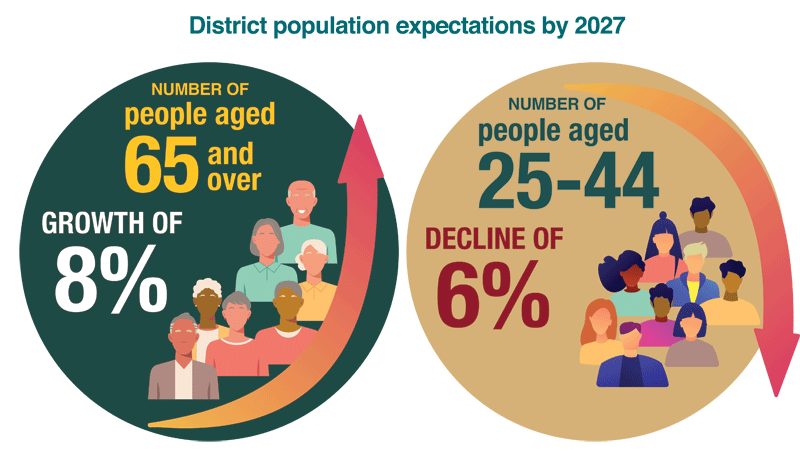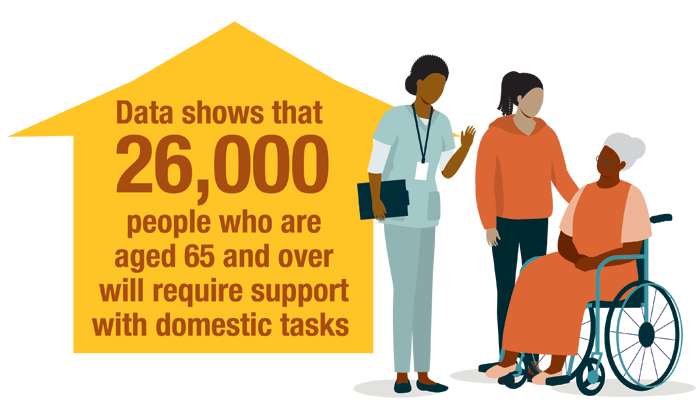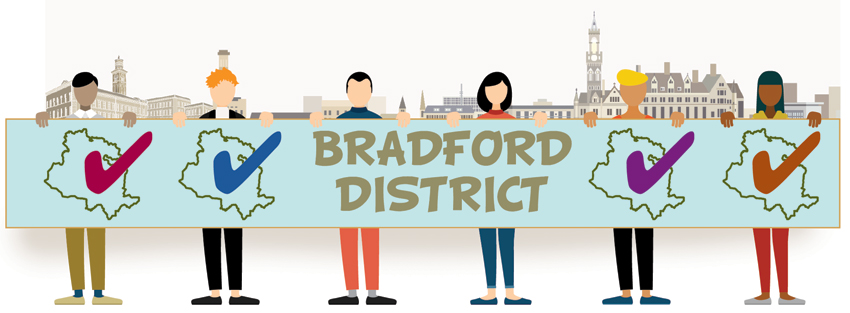
Future demand

We know that demand for adult social care services will grow over the next 5 and 10 years.
The population aged 65 and over in Bradford is expected to grow by an average of 8% over the next 5 years. This raises the total number of residents aged 65 and over to an estimated 93,000 by 2027. The residents aged between 55 - 64 is likely to grow by 4%, while the residents aged 80-84 growing by up to 20%.
Data shows the number of people living alone will increase alongside the total population who have a limiting long-term illness (rising to over 23,500 by 2027).
In line with the increasing population of Bradford, the data estimates over 9,700 residents aged 18 and over will have a learning disability by 2027. It is expected that over 800 of these residents will have autism.
Similar trends can be found in residents with Mental Health. We expect over 22,900 residents with Mental Health problems by 2027. A further 13,743 residents are likely to have alcohol related issues within the district.

In 2022, Bradford had 5.8% growth in total care hours. If this level of growth continues, we would be commissioning 43,523 hours per week by the end of 2027.
How will we do this?
In line with our "Happy, Healthy, at Home" vision and the Three Tier model to meet future demand we will focus on:
- Early help and prevention – through a specific service offer and supporting all provision to act early and work in a preventative way.
- Services and accommodation that provide the most independence for people.
- Services that are flexible, adaptable and respond to points of transition and change in people’s lives.
- Community-led approaches.
Keep It Local
We are proud to work in partnership with several VCS organisations and we are registered to the Keep it Local campaign.
The Key Principles of Keep it Local:
- Think about the whole system not individual service silos
- Co-ordinate services at a neighbourhood level
- Increase local spend to invest in the local economy
- Focus on early intervention now to save costs tomorrow
- Commit to your community and proactively support local organisations
- Commission services simply and collaboratively so they are "local by default"

Promoting Voluntary, Community and Social Enterprise (VCSE)
We aim to further develop effective relationships with the VCSE that works for the people of Bradford district.
We want to work with more voluntary sector businesses to support the people of Bradford and support local organisations over the next few years.
We have committed to promoting the role of the VCSE within Adult Social Care by:
- Working with VCSE partners to respond to people’s holistic needs, maximising how we use our collective resources sustainably.
- Improving people’s experience by increasing our understanding of the impact and benefit of what we do and using this knowledge to innovate and improve the way we commission services.
Accommodation needs
We are continuing to actively reduce the number of people in residential care, including people with Learning Disabilities, Autism, Severe Mental Illness, and older people. This means we need more accommodation that enables people to live as independently as possible in the community.
Learning Disabilities:
- We have approx. 130 people with a Learning Disability who could potentially move or be diverted from placements in residential care homes to supported living.
- There are nearly 500 young people aged between 8 and 17 in the District who have profound or severe Learning Disabilities living in the District who may need care and support as they enter adulthood.
- It is estimated that to meet demand, we will need an additional 85 units of supported living over the next 10 years.
Severe Mental Illness:
- We have a small number of complex forensic inpatients who require supported housing, which can sometimes be difficult to source.
- It is estimated that to meet demand, we will need an additional 46 units of supported living over the next 10 years.
Any new supported living should be:
- High quality and small-scale
- Embedded within our local communities
- Adaptable
Our Bradford Housing and Accommodation Strategy for people with disabilities can also be found on Commissioning Adult Health and Social Care Services page.
Older People:
- For older people our focus will be on support to live in the community, for example through the use of technology and home adaptations and extra care.
- Further information will be uploaded on extra care demand once our review has been completed.
Further information can be found in our Market Sustainability Plan (PDF).
YORtender
We encourage all providers to sign up to YORtender and set up tender alerts for the latest council procurement opportunities. If you would like to know more, please see the Apply to do business with us page or email us at [email protected].